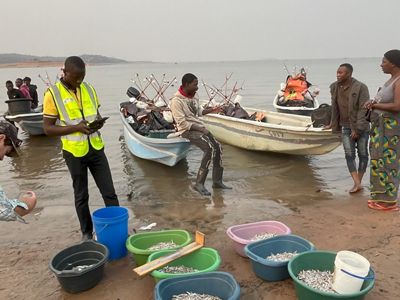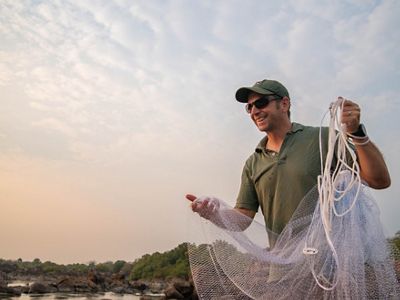In Zambia, TNC and partners are working toward improved management of 200,000 hectares of lakes and wetlands and 1,000 kilometers of rivers with at least 150 kilometers of new river freshwater ecosystems protected. Through this work, 6,000 fishers will have improved security of rights over fisheries resources and 7,000 people in the fisheries sector have improved sustainable, place-based economic opportunity with more than 30,000 associated direct beneficiaries. In October of 2024, TNC’s Freshwater Fisheries (FWF) Strategy team traveled to Zambia to strengthen relationships with, facilitate information sharing with and provide technical support for TNC staff, other partners and communities who are working on the co-management of freshwater fisheries there.
TNC’s freshwater fisheries work has initially focused on fisheries within Zambia’s 10-million-hectare Kafue-West Lunga landscape, which spans West Lunga and Kafue National Parks and the surrounding community conservation areas. This landscape — a tangle of rivers, lakes and wetlands — covers more than 60% of Zambia’s natural habitats and is rich in biodiversity. It’s also home to the Busanga Swamps, a Ramsar site that supports some 130 species of fish, representing more than 60% of the entire Upper Zambezi River fish fauna. Linking the value of these conservation areas and their aquatic biodiversity provides to local communities in the form of food security, income and livelihoods is a core theme of the work. Through community-led fisheries co-management, TNC and its partners are working toward sustaining and enhancing these ecosystem services.
“The partners in Zambia began the work here in 2023,” said Allison Aldous, the strategy director for TNC’s FWF program. “The initial success and optimism from their efforts have garnered attention from other communities that rely on freshwater fisheries, as well as government partners. And because of their collaboration and outreach, there now exist many opportunities to expand community-led co-management of freshwater fisheries to other important fisheries in Zambia.”

The Challenge
Historically, fisheries across the Kafue-West Lunga Landscape have had limited management attention (open access), which has left many fisheries overexploited. Illegal, unreported and unregulated fishing has impacted fishery yields and their value. Unsustainable resource management — including fisheries — and limited economic benefits to communities from conservation activities are top threats to Kafue & West Lunga National Parks and their encircling Game Management Areas.
Since 2023, TNC and partners in Zambia have been developing fisheries baseline data, establishing community-based fisheries governance structures, and advancing community co-management rights and participation in decision-making.
“The collection of robust socio-ecological data on fishes, fishing communities and stakeholders has given us a solid platform on which to build our fisheries work,” said Bruce Ellender, TNC’s Kafue conservation director. “We’ve had success in working with Zambia’s government to improve the governance and management of freshwater fisheries, which are now informed by fish diversity and distribution that we’ve collected. Key to this success has been the involvement of local communities in the fisheries management process — ensuring their voices are heard and reflected in management plans.”

In 2024, TNC signed a Memorandum of Understanding with the Zambia Department of Fisheries. The Kafue fisheries team, which includes TNC and Zambia Department of Fisheries staff, were officially appointed by the Zambian Government to oversee the fisheries management and freshwater conservation sections of the Kafue National Park General Management Plan. This Plan, initiated by African Parks, defines the fisheries management framework within the 2.2-million-hectare Kafue National Park. This is the first time freshwater protection and improved management has explicitly been included in the park’s General Management Planning process.
Using the solid foundation laid over the last two years, TNC and its partners are planning to expand the approach into other key fisheries areas in Zambia. A key focus will be supporting communities to develop and implement fisheries management plans that are tailored to meet local community objectives.
Initial priorities for new community co-managed fisheries in Zambia will include assistance with catch data collection and gender analyses to support the important roles of women in the health of fisheries.
